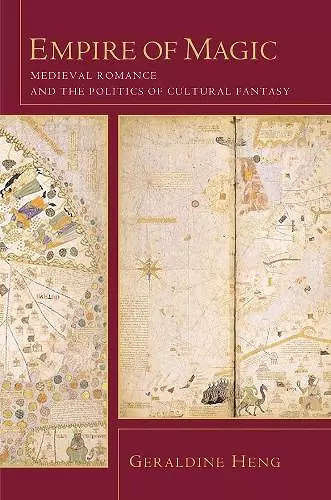Empire of Magic
Medieval Romance and the Politics of Cultural Fantasy
Format:Paperback
Publisher:Columbia University Press
Published:12th Nov '04
Currently unavailable, and unfortunately no date known when it will be back

Offers a genesis and genealogy for medieval romance and the King Arthur legend through the history of Europe's encounters with the East in crusades, travel, missionizing, and empire formation. This book provides definitions of "race" and "nation" for the medieval period.Empire of Magic offers a genesis and genealogy for medieval romance and the King Arthur legend through the history of Europe's encounters with the East in crusades, travel, missionizing, and empire formation. It also produces definitions of "race" and "nation" for the medieval period and posits that the Middle Ages and medieval fantasies of race and religion have recently returned. Drawing on feminist and gender theory, as well as cultural analyses of race, class, and colonialism, this provocative book revises our understanding of the beginnings of the nine hundred-year-old cultural genre we call romance, as well as the King Arthur legend. Geraldine Heng argues that romance arose in the twelfth century as a cultural response to the trauma and horror of taboo acts-in particular the cannibalism committed by crusaders on the bodies of Muslim enemies in Syria during the First Crusade. From such encounters with the East, Heng suggests, sprang the fantastical episodes featuring King Arthur in Geoffrey of Monmouth's chronicle The History of the Kings of England, a work where history and fantasy collide and merge, each into the other, inventing crucial new examples and models for romances to come. After locating the rise of romance and Arthurian legend in the contact zones of East and West, Heng demonstrates the adaptability of romance and its key role in the genesis of an English national identity. Discussing Jews, women, children, and sexuality in works like the romance of Richard Lionheart, stories of the saintly Constance, Arthurian chivralic literature, the legend of Prester John, and travel narratives, Heng shows how fantasy enabled audiences to work through issues of communal identity, race, color, class and alternative sexualities in socially sanctioned and safe modes of cultural discussion in which pleasure, not anxiety, was paramount. Romance also engaged with the threat of modernity in the late medieval period, as economic, social, and technological transformations occurred and awareness grew of a vastly enlarged world beyond Europe, one encompassing India, China, and Africa. Finally, Heng posits, romance locates England and Europe...
Heng offers a broad-reaching study of the intellectual and cultural origins of medieval romance... She is especially good at isolating and explaining the historical points of contact between West and East. Choice Her observations about literature, which are everywhere cogent and show the presence of a subtle and wide-ranging sensibility -- John Block Friedman, Kent State University Speculum Empire of Magic is a book that will set the terms of debate on medieval postcolonialism for some time to come. It is a must read. -- Laurie A. Finke Arthuriana Empire of Magic is on of the most thorough - and thoroughly engaging - examples to date in the emerging theoretical field of "postcolonial medievalism."... Heng's Empire of Magic is a "must read." e 3w Review of Books Empire of Magic is a... fascinating study of medieval romance. Forum for Modern Language Studies Fearless and provocative... Heng's scholarship and sweep are admirable. This is a must-read. -- Christine Chism Studies in the Age of Chaucer
- Runner-up for First Book Award 2004
ISBN: 9780231125277
Dimensions: unknown
Weight: unknown
536 pages